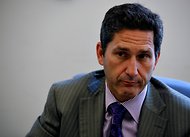 Scott Olson/Getty ImagesLiberty Global, the international broadband arm of John Malone’s media and telecom empire, has been expanding in Europe.
Scott Olson/Getty ImagesLiberty Global, the international broadband arm of John Malone’s media and telecom empire, has been expanding in Europe.
Liberty Global, the media company controlled by John C. Malone, offered on Thursday to buy the roughly half of Belgium’s Telenet Group Holding that it did not already own for about $2.5 billion in cash, as it continues its push into Europe.
Under the terms of the proposal, Liberty Global will begin a tender offer of 35 euros a share, about 14 percent higher than Telenet’s one-month average volume-weighted closing price.
Shares in Telenet climbed more than 12 percent in afternoon trading on Thursday, to 34.88 euros.
Related Links
Liberty Global, the international broadband arm of Mr. Malone’s media and telecom empire, has been expanding in Europe in recent years largely through acquisitions like the German cable providers Kabel Baden-Wuerttemberg and Unitymedia. And it bought a controlling stake in Telenet in 2007.
Based in Mechelen, Belgium, Telenet has become one of the biggest television and broadband Internet service providers in the country, with 2.2 million residential cable-TV subscribers and 1.3 million Internet customers as of Dec. 31. But its profit has fallen over the last two years, down to 16.8 million euros in 2011.
 Brendan McDermid/ReutersMike Fries, chief executive of Liberty Global.
Brendan McDermid/ReutersMike Fries, chief executive of Liberty Global.
Still, its stock price has leaped 37 percent over the last five years.
“We believe this is the right time for Telenet to become a wholly-owned part of Liberty Global’s pan-European platform in its next stage of development, particularly in light of the competitive and regulatory outlook in Belgium,” Mike Fries, Liberty Global’s chief executive, said in a statement. “We are proud of the success Telenet has achieved over the years and of the many innovations it has brought to Belgian consumers.”
Liberty is being advised by Morgan Stanley and the law firm Freshfields Bruckhaus Deringer.
This post has been revised to reflect the following correction:
Correction: September 20, 2012
An earlier version of this article misstated the number of Telenet customers. The company has 2.2 million, not billion, residential cable-TV subscribers and 1.3 million, not billion, Internet customers.
Article source: http://dealbook.nytimes.com/2012/09/20/liberty-bids-2-5-billion-for-rest-of-belgiums-telenet/?partner=rss&emc=rss